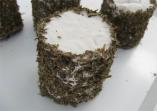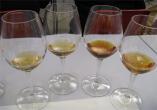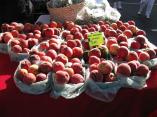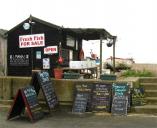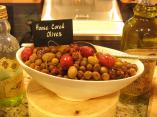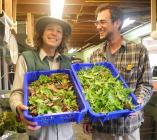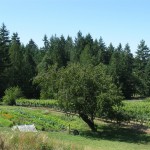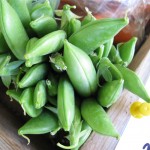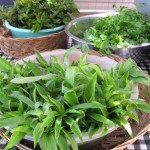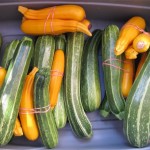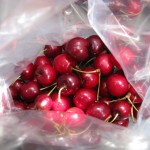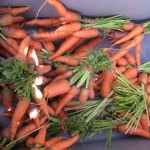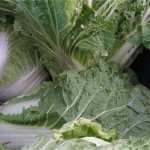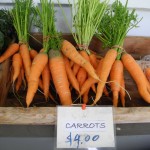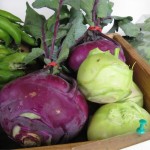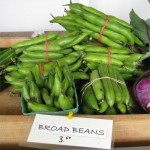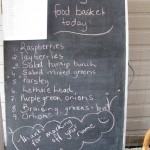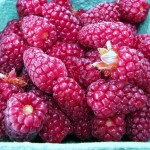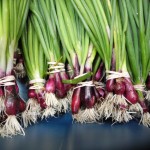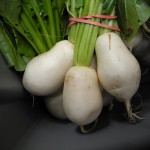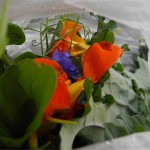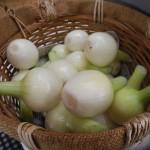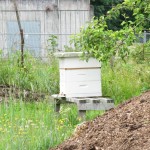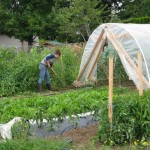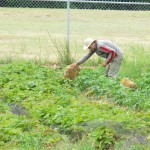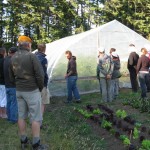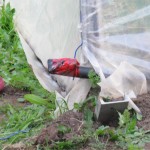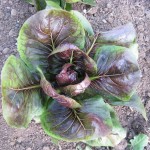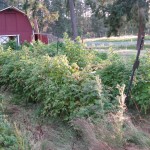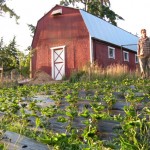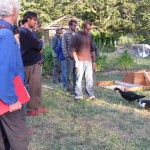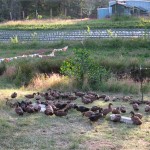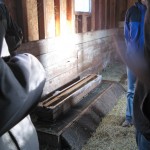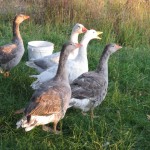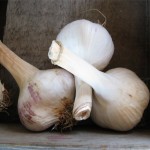 It’s all about the garlic just now. Harvests are in. Those who haven’t experienced devastating losses due to excess moisture and rot are crowing about the enormous healthy bulbs that are popping up at farm stands all over Vancouver Island. They cost between $2 and $3 a bulb at farmers markets; more than that if sold by weight, as they’re plump, fresh and juicy and a world away (literally) from the cheap bulbs from China.
It’s all about the garlic just now. Harvests are in. Those who haven’t experienced devastating losses due to excess moisture and rot are crowing about the enormous healthy bulbs that are popping up at farm stands all over Vancouver Island. They cost between $2 and $3 a bulb at farmers markets; more than that if sold by weight, as they’re plump, fresh and juicy and a world away (literally) from the cheap bulbs from China.
Farmer Ray at Haliburton Farm certainly has something to crow about. Customer after 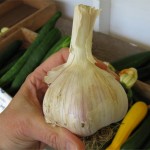 customer came by and marvelled at it, and insisted it must be elephant garlic! But it’s just good old organic hardneck garlic. Ray’s farming smarts, winning ways with compost and several years of patient experimentation have led to a record yield this year: some 1000 bulbs pretty nearly the size of a tennis ball. He planted deeply, spaced well and mulched it well in March with a thick layer of some of his amazing organic compost.
customer came by and marvelled at it, and insisted it must be elephant garlic! But it’s just good old organic hardneck garlic. Ray’s farming smarts, winning ways with compost and several years of patient experimentation have led to a record yield this year: some 1000 bulbs pretty nearly the size of a tennis ball. He planted deeply, spaced well and mulched it well in March with a thick layer of some of his amazing organic compost.
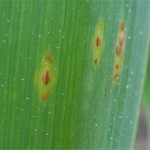
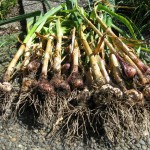 My own yield – harvested nearly two weeks ago – was more modest, but I believe all 14 cloves I planted came up and, aside from some split bulbs the bulbs look healthy and firm with no sign of mold. Like last year, they showed some rust that had persisted on the overwintering leeks, despite ministrations with home-made sulfur spray. It didn’t affect the bulbs, though, and they’re drying in an airy corner of the shed as I write.
My own yield – harvested nearly two weeks ago – was more modest, but I believe all 14 cloves I planted came up and, aside from some split bulbs the bulbs look healthy and firm with no sign of mold. Like last year, they showed some rust that had persisted on the overwintering leeks, despite ministrations with home-made sulfur spray. It didn’t affect the bulbs, though, and they’re drying in an airy corner of the shed as I write.
After they’ve dried properly in another few days I’ll cut them down and peel off the grubby wrappers. The choicest bulbs will be saved for seed. One thing I learned this year, thanks to a lively discussion on the COG listserve, was to check the base of the cloves for two distinct ‘footprints’ – and if found, to separate the cloves even if there is only one clove skin, because otherwise they’ll split after planting. I did successfully pull up and replant a split clove but it’s not recommended. The fatter the bulb and cloves you plant, the bigger your plants will be next year, says Ray.
I planted a mixture of soft and hard necked and so finally got scapes this year, which I put 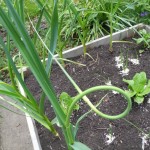 into soups and so on where garlic was called for: felt happy about this as it was great to get fresh garlic of any kind at the end of a long dark spring.
into soups and so on where garlic was called for: felt happy about this as it was great to get fresh garlic of any kind at the end of a long dark spring.
I’ve been thinking on how to store the garlic this year. I usually just keep it with the onions in a loosely covered bin or mesh bag. Various people I’ve talked to have been freezing it and two versions I’ve heard are: peel the cloves and freeze in ziplocks (easy to slice paper thin); or grate or mince and freeze in a slab in a tray, then cut the block into clove-sized pieces and keep frozen to pull out the right portion for your recipe. You can also dehydrate it. I haven’t really enough to start experimenting I think, but am planning to plant more for next year.
One of many interesting facts gleaned from the helpful folks at Boundary Garlic Farm is that “Supermarket garlic has usually been kept cold in controlled storage. If garlic has been kept cold it soon begins to sprout when brought to room temperature.” They recommend storing at a constant room temperature in one of those plastic mesh bags – that if you’re like me you’ve stashed away thinking it might come in handy for something…
